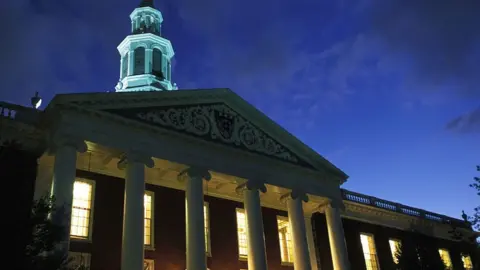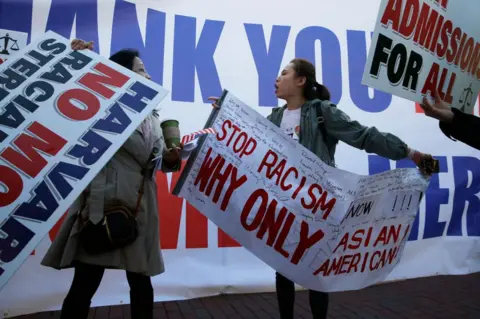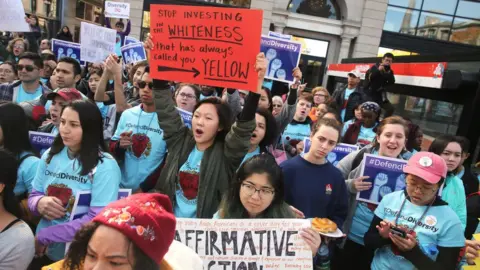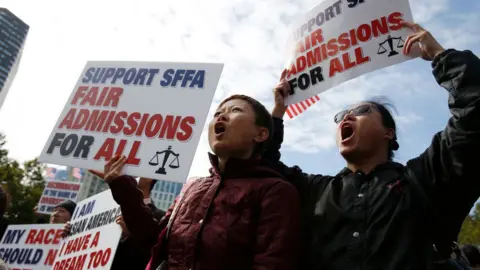Affirmative action: Harvard racial admissions trial begins
 Getty Images
Getty ImagesA trial against Harvard University has begun in the US, and may have wide-ranging implications for universities and racial minorities.
The case was brought by a group that claims Harvard's admissions office discriminates against Asian applicants in order to boost other racial groups.
Harvard disputes the claim and says race is only one small factor in their secretive student selections process.
The trial is being seen as a referendum on affirmative action hiring practices.
Harvard is one of the top-rated and most selective universities in the US, admitting about 1,600 freshman students out of 42,000 applicants each year.
Before the trial opened in a Boston federal district court on Monday, groups of protesters took the streets in the city, either opposing or supporting an admissions policy that includes race as a factor.
The case has been brought by a group from the Washington DC area called Students For Fair Admissions, which ultimately wants courts to rule that race-based decisions in education are a civil rights violation.
 Getty Images
Getty Images Getty Images
Getty ImagesWhat does the lawsuit claim?
The lawsuit, brought by a group called Students For Fair Admissions, claims that the elite university unfairly weighs race when considering an applicant, forcing Asian-Americans to meet a higher bar in order to be accepted.
They claim Harvard uses a quota system or a system of "racial balancing" - practices that are illegal under federal law - to limit the number of Asian students on campus in an effort to maintain space for other racial groups.
The plaintiffs say that if race was not considered, and if admissions were only based on grades alone, twice as many Asian pupils would be admitted because they perform well academically.
The case is expected to shed light on admissions practices at universities. Courts have previously allowed universities to examine race as a factor in order to promote diversity on campus, a practice known as affirmative action, or "reverse discrimination".
Some unexpected revelations could also come out of the trial, such as how the university considers the children of alumni or donors, or the applications of other pupils who are not admitted through the typical process.
What does Harvard say?
Harvard says they use a "holistic" strategy to evaluate students, and that race is only one minor consideration.
The institution points out that its population of Asians students has been growing, and now stands at 23% of the student body.
Harvard University Dean Rakesh Khurana told WBUR that it takes more than just good grades to be chosen.
"We're looking for people who are genuinely curious. Not just those who do well on exams but actually want to lean and have an integrative capacity," he said.
Other Ivy league schools and the American Civil Liberties Union (ACLU) are supporting Harvard in the case.
In an amicus brief - a court filing supporting Harvard - the ACLU argued that "a whole-person, race-conscious admissions process furthers a university's academic freedom to assemble a diverse student body".
Who is suing?
The Students For Fair Admissions group was formed by conservative activist Edward Blum - who opposes affirmative action, ie the proactive effort to include minorities that have been historically marginalised due to discrimination.
He previously brought a case against the University of Texas, in which a white student claimed to have been discriminated against. It was rejected by the US Supreme Court by a vote of 4-3 in 2016.
 Getty Images
Getty ImagesThe Trump administration has filed an amicus brief in support of the organisation.
The Justice Department has also launched a probe into whether Yale University discriminates against Asians - something which it denies.
What happens next?
The trial is expected to last two to three weeks.
But regardless of the outcome, the loser is expected to appeal the verdict to the US Supreme Court.
